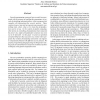Free Online Productivity Tools
i2Speak
i2Symbol
i2OCR
iTex2Img
iWeb2Print
iWeb2Shot
i2Type
iPdf2Split
iPdf2Merge
i2Bopomofo
i2Arabic
i2Style
i2Image
i2PDF
iLatex2Rtf
Sci2ools
113
click to vote
CONCUR
2009
Springer
2009
Springer
Flow Policy Awareness for Distributed Mobile Code
Several programming constructs have recently been proposed with the purpose of enabling the programmer to encode declassifying information flows within a program that complies with information flow security policies. These constructs may or may not incorporate some means for controlling when, where, what, or by whom the declassification can be set up. In the context of global computing, other forms of controlling declassification that transcend the power of a single declassification construct may turn out to be desirable. In this paper we point out potential unwanted behaviors that can arise in a context where programs that contain declassifying instructions can migrate to computation domains with different security policies. We propose programming language design techniques for tackling such unwanted behaviors and prove soundness of those techniques at the global computation level.
CONCUR 2009 | Distributed And Parallel Computing | Security Policies | Several Programming Constructs | Unwanted Behaviors |
Related Content
| Added | 26 May 2010 |
| Updated | 26 May 2010 |
| Type | Conference |
| Year | 2009 |
| Where | CONCUR |
| Authors | Ana Almeida Matos |
Comments (0)

